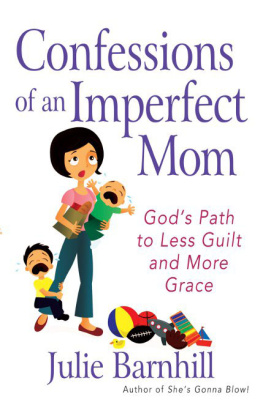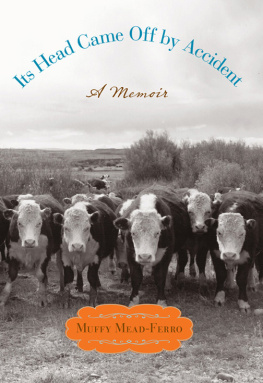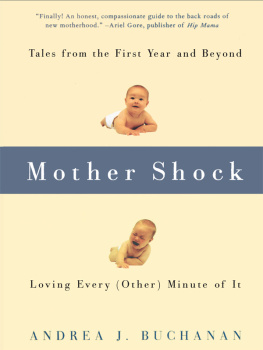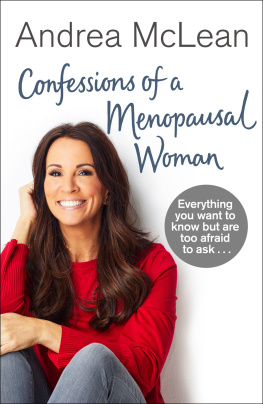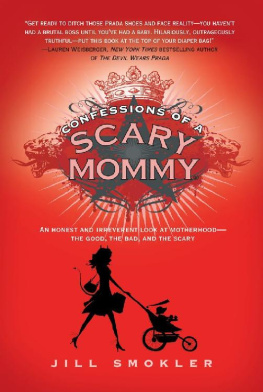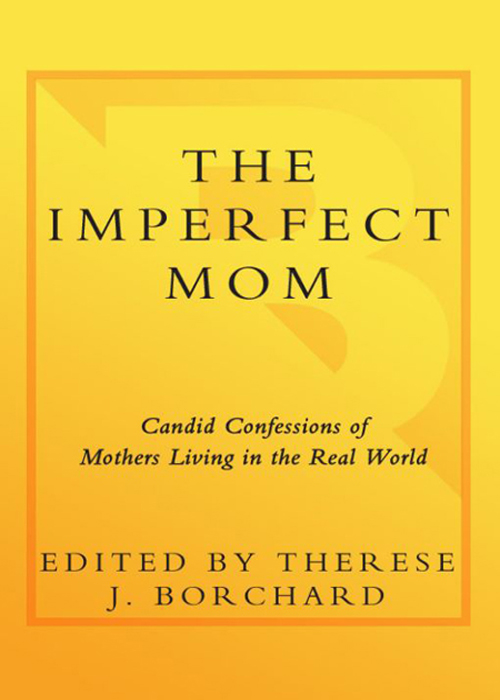

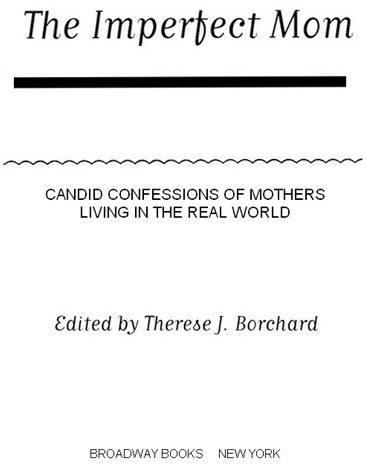
Table of Contents
For Chris LaPanta, my angel with six-pack abs, who saved little Will.
And for Stacey Hopkins, Wills mom, who befriended me instead of killing me.
ACKNOWLEDGMENTS
The idea for this book would have never made it safely to my brain had it not been for the suggestion of Suzette Guiffre at Chesapeake Family magazine to write an article called Confessions of an Imperfect Mom, following the harrowing afternoon that the toddler (little Will) under my care was rescued from the fifteen-feet-deep, frigid waters at the city dock in Annapolis, Maryland. Although I was initially peeved at her gall to attach such a label to me, I realized that such a story might relieve the unnecessary burden carried by other closet perfectionist moms.
Of course I thank my new hero, Chris LaPanta, who had the misfortune of choosing my crime scene as the perfect place to chow down some sushi following an Ash Wednesday service where he apparently earned his wings as my angel. Bouquets of roses have gone and still go to Stacey Hopkins, Wills mom, who never once judged me, but instead befriended me and showed me the way a truly kind person would handle that situation.
Hugs and kisses also to my editor, Patricia Medved, who admitted in our first conversation that she was a member of the imperfect club, and who has guided the manuscript with the skill and expertise of a woman who has mastered a trade; to her assistant, Beth Datlowe, who is any writers dream to work with; and to my best friends at Doubleday, Trace Murphy and Michelle Rapkin, whose insight was invaluable when I held a mere seedling of an idea.
Lots of gratitude go to Claudia Cross, my agent, whose enthusiasm for this project inspired me to go for it, and whose feedback shaped the book into an important contribution to mommy lit.
Boxes of chocolate (theyre coming) to Shana Aborn, the first mom I contacted, who e-mailed her list of writer and editor friends, many of which are on the contents page; to Katharine Weber, for her contacts; and to those very brave souls who submitted pieces for the proposal before I could promise a fair compensation: Andrea Buchanan, Deborah Caldwell, Gabrielle Erickson, Muffy Mead-Ferro, Katherine Lee, Jacquelyn Mitchard, Ronnie Polaneczky, Teme Ring, Rochelle Shapiro, Helene Stapinski, Mary Elizabeth Williams, and Caroline Leavitt* (who gets a star next to her name for sharing with me every trick she knows about selling a book).
Mike Leach, my partner on other books, gets credit for everything I write and compile because without his help and mentorship, I wouldnt be writing for the big guys like Broadway; my good friend John Thomas threw out the subtitle that stuck; and Lisa Biedenbach pitched in her two cents at that nice, quiet dinner (the only one that year), where it all came together for the first time.
I know I must be skipping a gazillion people, like all the production, marketing, and publicity staff at Broadway. (Sorry! Although Im not standing behind a microphone holding an Oscar, the pressure of an impending deadline has the same effect.)
Last but not least, thank you, Mom, for being a good imperfect mom; thank you, Eric, for loving me despite my imperfections; and thank you, Katherine and David, for providing me with so many opportunities to be imperfect.
Oh! And thanks, Will, for knowing instinctively how to doggy paddle before the lessons. Phew!
FOREWORD
THE PERFECT ENOUGH MOTHER
Kathryn Black
My friend laughed, that slightly hysterical oh-my-God laugh, when I told her my dismaying story. In rounding up a gaggle of children from our elementary school to escort them home, Id forgotten a neighbors child. I was laughing at seeing myself as recipient of the Bad Mother of the Month award, able to laugh because it turned out fine. The girl was a fourth-grader and snagged a ride with someone else. Her mother and I had been trading care of our children for a good decade by then, and shed let me off easy.
No worries, my laughing friend told me, Youre a good enough mother.
The label stopped me short. I know it has soothed many an overworked, harried, well-meaning mother; in other words, most of us. Over the decades, though, the good enough mother has suffered what a marketing expert might call image creep. A Google of good enough turns up uses like these: second best, but good enough and good enough for government work. These connotations are useful if were discussing any number of duties that simply arent worth full-out effort, such as tidying up for company or tackling post-vacation e-mail. But mothering? Second best isnt what most of us had in mind for ourselves or our children.
Id been mulling this concept over for a while, when in yoga class one day my teacher suggested we each try for a perfect pose. Shes not a yogi who pushes and demands. She surely knew that none of us could achieve, on this day, perfection of any kind. But still she said, Try. As we moved into a cobra pose, she instructed us, Relax into it. Lead with your heart. That day, I held my cobra a fraction longer, a trifle higher, and much more joyfully. And I thought about mothering.
I decided that, like yoga, its not whether the outcome is perfect, but whether weve led with our hearts. Thats what matters to children. Like every mother I know, I get caught up in that how-much-is-enough/never-enough thinking. Because, in truth, we can never do enough. But we can be enough for our children.
What if instead of seeing our mothering as good enough, we thought of ourselves as perfect enough, like my cobra posenot without flaw or fault, but aiming to be full, complete.
Home after yoga, I looked up what British pediatrician turned psychoanalyst D. W. Winnicott, who coined the phrase good enough mother, had to say.
He didnt talk about starting a three-year-old with Suzuki violin lessons, ensuring that my eight-year-old never ever has to wear a dirty soccer uniform to a game, or buying your teen the designer clothing and big-screen TV everyone else has. Winnicotts prescription was devotionabiding, affectionate attention. Lead with your heart. He maintained that every infant needs a mother whose faithful care literally keeps her baby alive. Then as the child grows and develops, the mother, in a natural way, meets her youngsters needs less completely, thereby allowing the childs self to emerge.
This is what Winnicott meant by good enough. Too little devotion and the infant cannot live, too much devotion as the child grows and you stifle him. And were more likely to hit that just-right dose if our intentions point high. Were Winnicott with us today, I think he would look at whats become of good enough and write instead of the perfect enough mother.
By ditching good enough mother we throw out the second-rate implications that now go with it, dragging us down. Just thinking of myself as the perfect enough mother makes me stand a little straighter, step a bit more firmly.
With all this in mind, I began to move through my days of juggling the tasks and concerns of motherhood, aware of that contribution Winnicott saw in my daily mothering. I began to see that the distinction between perfect enough and falling short isnt in whether my children wear handmade Halloween constumes this year or whether the cupcakes for their birthday parties have sprinkles on them. It lies instead in my heart.
Next page


